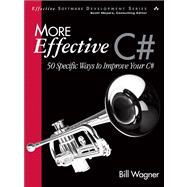In More Effective C#, Microsoft C# MVP and Regional Director Bill Wagner introduces fifty brand-new ways to write more efficient and more robust software. This all-new book follows the same format as Wagner’s best-selling Effective C# (Addison-Wesley, 2005), providing clear, practical explanations, expert tips, and plenty of realistic code examples.
Wagner shows how to make the most of powerful innovations built into Microsoft’s new C# 3.0 and .NET Framework 3.5, as well as advanced C# language capabilities not covered in his previous book. Drawing on his unsurpassed C# experience, the author reveals new best practices for working with LINQ, generics, metaprogramming, and many other features. He also uncovers practices that compromise performance or reliability and shows exactly how to avoid them.
More Effective C# shows how to
- Use generics to express your design intent more effectively
- Master advanced generics techniques, such as constraints, method constraints, and generic specialization
- Use the multithreaded techniques you’ll need to work with the .NET framework every day
- Express modern design idioms using the rich palette of C# language features
- Successfully mix object oriented and functional programming constructs
- Create composable interfaces and avoid confusion in public interfaces
- Use extension methods to separate contracts from implementation
- Program successfully with C# closures and anonymous types
- Write more effective LINQ queries
- Make the most of LINQ Lazy Evaluation Queries and Lambda Expressions
- Distinguish and convert between delegates and expression trees
- Efficiently utilize nullable types and partial classes
- Use implicit properties for mutable, nonserializable data
You’re already a successful C# programmer—this book can help you become an outstanding one.








